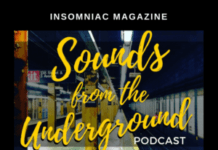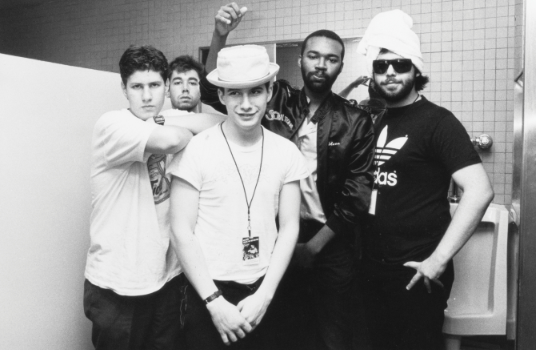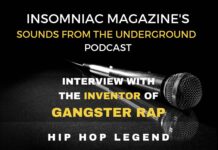
NARM (National Association of Recording Merchandisers) is celebrating its 50th year in business. This year’s NARM Convention will take place at the San Francisco Marriott on May 4-7. Also taking center stage during NARM’s annual conference is Digital NARM, which will address and discuss the digital side of music retailing.
Throughout the years, NARM has consistently proven to be one of the most valuable music business events in the industry. Attendees include music wholesalers, retailers, one stops and distributors, as well as suppliers, labels, and others involved with bringing music to the retail (both physical and digital) marketplace. Some of the featured performers scheduled this year include blues legend BB King, electronica favorites The Crystal Method, five-time Grammy award winner Michael McDonald, and many others.
To register to attend this year’s major music industry milestone, visit: NARM

I had the pleasure of speaking with NARM President Jim Donio, and he shared his thoughts about the current state of the music industry, and the value that NARM delivers to its members. Mr. Donio was named as the organization’s top executive in 2004, however, he started his career with NARM twenty years ago in 1988.
Here is the interview with Mr. Donio:
I: Can you tell me a little bit about your duties as the president of NARM?
Jim Donio: I am the president of the National Association of Recording Merchandisers (NARM) and the mission of the association is to advance the business of music in all respects. That encompasses many different vehicles, formats, and delivery mechanisms today to get music to the music fans. So we represent the various facets of stores, be they physical or online, and our members also include record labels, distributors, new media companies, mobile companies, various types of suppliers (that provide related products and services that are important to the industry as well), educators, artists’ managers, etc. So it’s a very eclectic and diverse community and my job is to ensure that we’re providing the appropriate business opportunities and forums for different segments to come together and talk about their mutual challenges, to address their differences, and have an opportunity to have dialogue to work out solutions that make sense to advance the business. We also oversee lots of consumer research we do to help our member companies make more informed business decisions so we do a lot of that. We put together major events like our convention and my responsibility, in terms of the convention, is providing the overall creative vision for the event and then I work very closely with the music companies to assemble the musical program for the event. I do work very closely with the record companies assemble those program elements.

I: I know obviously there’s a digital component to NARM and I was wondering if you feel that it’s been a challenge?
Jim Donio: It’s an opportunity. I would say that it’s a way in which we can truly reflect on the present industry and what the marketplace looks like and what the future will bring for our industry. For the foreseeable future we’re going to be dealing with a hybrid market place which is going to have physical product and digital product in a balancing situation as we continue to make this shift in consumer experience and consumer preferences. There will always be some type of physical product. It’s currently a CD or a DVD, and going forward I think there will still be a physical component; the question is what will that be. You know we’ve just done some research on new physical formats and actual hybrid products so that’s very interesting, and the opportunities are very interesting in that respect. The constituency of NARM is everything from physical stores that are selling primarily physical products all the way up to Best Buy, I-tunes, Amazon, and AT&T. So, it’s a very unique membership that we have and, for that reason we look at incorporating new media and incorporating digital as a great opportunity for us. It’s a great way that we can continue to help the industry to develop and migrate from a business model that’s been strictly physical to where we are currently which is coming up with an appropriate blend of physical and digital and seeing where that’s going to go moving forward. So the digital NARM conference that we started last year is now our primary face to face vehicle to bring some of these new companies into the community to share their information and for them to have a way in which they can now meet with our existing companies and look at where the opportunities exist for all the different segments up and down the channel and up and down the pipeline to improve their businesses by selling digital entertainment.
I: Can you talk for a moment about some of the existing hybrid products that you found within your research?
Jim Donio: Some of the products are already in the marketplace. The Warner Music Group introduced, about a year ago, something called MVI (Music Video Interactive), which is a DVD based product. Hollywood Records introduced last year a product called CD-View Plus with the Jonas Brothers. …a traditional CD product that has enhancements. It doesn’t come with a booklet. You go online for the liner notes, photographs, additional information about the artist, etc. Some artists and labels have released jump drives, which is a product that connects to your computer and stores information, music, photographs, etc. on the drive…then you can pop it into your computer, and access the entertainment that way.
There are lots of opportunities that exist in that respect. Now there are digital cards in stores, where the album cards are made available instead of the physical CD if that’s the consumer’s choice. And, there may be the basic music that you would find on the CD, but in many cases there might be additional content or additional opportunities that will connect you. You know you take the card home, you put the information into your computer and you access the music but it also becomes a portal to take you to other opportunities. There are other products and technologies that are in development now that we’re also looking at that are part of our research that provide that same kind of experience. We’ve got a lot of work still to do as we move our way through all these new products, formats, and opportunities and continue to determine what consumer’s really want. There’s just so much going on right now. This is an unprecedented transformation for the music industry- lots of innovation and great ideas. We’re still dealing with a situation of ramped piracy, which is a very significant challenge for the industry, and continues to be a great concern. Retailers and labels of all shapes and sizes are really having to redefine themselves, look at their profile and come up with what is appropriate for their business model going forward. In the midst of all that we have this tremendous innovation and lots of great ideas that are coming forth. None of us have a crystal ball to know exactly what’s going to succeed or what’s not going to succeed, but I think the positive energy around all of this is that the industry is opening up new doors and looking at these new avenues.
I: What do you feel the future holds for small independent mom and pop retailers when competition of from mass merchants that have deeper resources and visibility?
Jim Donio: Don’t underestimate the consumer population. The consumer population is so diverse and so eclectic and they want to have choice. There’s nothing that can replace the experience of going into a physical store environment and actually engaging with people and having discussions with people about the kinds of music you like, and promoting discovery that way. Maybe seeing a new artist or band perform in a store, meeting them, having them interact with you, making it an experience of actually discovering the music, purchasing the music, enjoying the whole experience of that. You can’t replicate that in the same way you can in store environments. Independent stores are so adept at that and have always been and I think that will continue to be. I think there continues to be great, great opportunity for independent stores. Many of them are exploring what their digital footprint can be and what kinds of digital experiences they can incorporate into their brand. There are many successful independent store brands, hundreds of them, across the country, that in fact [on] April 19th many of the independents across the country have pulled their resources and are joining forces for something called Record Store Day. That’s going to be on Saturday April 19th across the country, and they’ve gotten tremendous support from the artist’s community. Metallica is actually going to appear at one of the stores in California. There’s great energy and great opportunity around the importance of music stores in our culture, in our lives and they will continue to migrate and change over time just as they have over the past 50 years.
I: If you could talk for a moment about mobile opportunities. How is the digital component of NARM going to address the mobile marketplace? And, can you discuss some of the providers and carriers that are going to be represented?
Jim Donio: There definitely will be represented companies like AT&T, Nokia, Motorola, and Sprint are all involved with NARM and will certainly be involved at our digital conference- Digital NARM. We have a session called the Mobile Movement and that is definitely going to explore…where mobile is right now. [It will ask the questions.] What are the opportunities? What are the promotional vehicles that are used in the community to become more integrated, more involved in how music is delivered to the consumer. We’re a tremendous threshold for enormous developments in that area. NARM wants to be at the centerpiece of that.
I: As far as the independent label is concerned, I think that a lot of the barriers have come down- specifically online, with the viral video sites out there like YouTube. However, on the retail side it seems as though the barriers are greater than ever. There is less retail real estate, and physical space is more valued. So, indie labels are vying for space with marketing dollars that can’t compete with that of the bigger competition. I was wondering if you could lend insight into what independent labels can do.
Jim Donio: All of that is true. I think that there are challenges there for independent stores and independent labels as well to try to break through to provide and come up with an edge, an opportunity to set themselves apart. It continues to be a climate where it is difficult. I think the fortunate thing is so many of these companies are very savvy and have found a way to carve out niches for themselves- both the smaller stores and the smaller labels as well. I think that is to their great credit in these tough times. You know these tough times aren’t unique to just the music industry, we’re in a very tough economic climate overall right now. You’re looking at oil prices, gas prices, the cost to travel, credit situation, the home market; you know the climate that we’re in, not just the music climate, the overall climate is providing people with challenges under personal and professional circumstances. I think greatly to the credit of the smaller businesses in our industry, that they manage to really be lean and mean and find a way to set themselves apart. With the independent stores doing this record store day, I know the independent record label community is pulling together an event for July called Independence Days. They’re going to do a few days of activities. They’re going to focus the spotlight on independent music from the label side. These are the kinds of things that I give both of those communities great credit for because as you’ve articulated it isn’t easy. It is not easy in this business right now and you’ve got to find ways to set yourself apart. You’ve got to find ways to streamline your business in these tough economic times. To their [independent stores/labels] credit they’ve done that, they’ve continued to do that and they share a passion for the business which you must have. To deal with all these challenges you have to love what you’re doing.
(Images courtesy of NARM)


